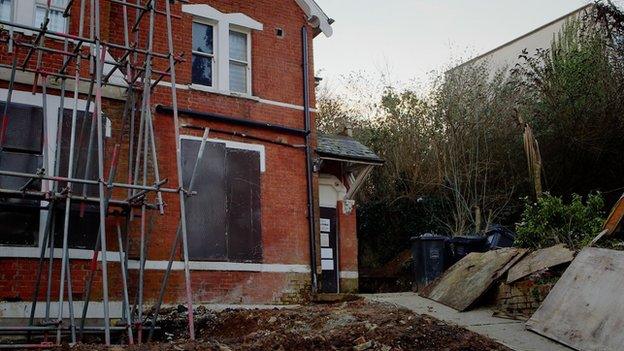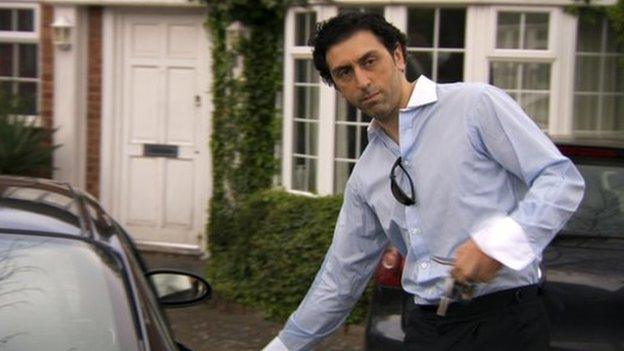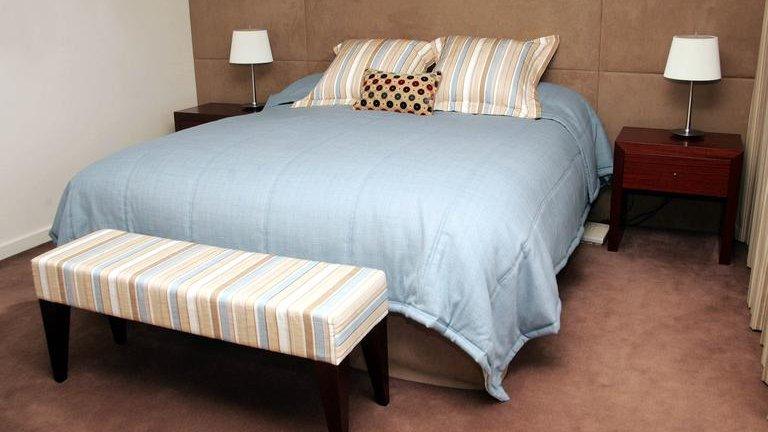The great housing benefit scandal
- Published

Exterior of the house managed by Mustafa Kemal Mustafa in Lewisham
Nine billion pounds of taxpayers' money goes to private landlords every year in housing benefit.
And the Institute for Public Policy Research estimates, external that at least £3bn of that money is spent on poor quality accommodation annually.
That's a lot of public money. And some private landlords are getting rich at our expense while, in some areas, 70% of privately rented homes don't meet the government's decent homes standard.
Despite the huge amounts at stake, councils across the country have little control over where housing benefit ends up. And some unscrupulous landlords are taking the cash while exploiting vulnerable tenants.
BBC Panorama has investigated some of the landlords getting millions of pounds from the taxpayer for housing people in cramped and poor quality accommodation. In the midst of a housing crisis, it didn't take us long to find some shocking examples.
Former cage-fighter Mustafa Kemal Mustafa manages several properties in the South London borough of Lewisham.
Big profits
One of his properties was closed down last year by the local council in an emergency evacuation. The council said that the house was overcrowded and the electrics had been dangerously hotwired. It was so unsafe that the energy company cut the supply.
When we filmed in the house, it was eerily quiet. Tenants had been evacuated in a rush and many had left their possessions behind. It was like their lives had been abandoned.
The night the council shut it down, there were 23 people living in the house. At one point, there had been 40. I saw one tiny room where four grown adults had been sleeping in bunk beds.
The conditions were dire - and it was the taxpayer who was picking up the bill.
Mr Mustafa was receiving up to £12,000 a month in housing benefit for this one property.
He denies that there were too many people in the property or that the property was inadequate or unsafe. Mr Mustafa says someone else tampered with the wiring and that he took care of vulnerable residents.
But the local council says he targeted desperate people and exploited them for housing benefit.

Landlord Mustafa Kemal Mustafa
Local authorities can find themselves effectively rewarding rogue landlords - handing out significant amounts of housing benefit with one hand, while trying to prosecute them for non-compliance with the other.
Roz Spencer of Lewisham Rogue Landlords Team knows the problem all too well. She told us the landlord could be the "biggest villain that walked this earth", yet the local authority would still have to hand over the housing benefit.
The government has toyed with the idea of making the payment of housing benefit conditional upon landlords meeting certain standards. But this might unfairly penalise the tenant - and could leave them homeless.
So it's up to local authorities to take bad landlords to task. But this is a big job for small, often under-resourced teams. And from what we saw, the process of prosecuting rogue landlords can be long and complex.
Roz Spencer would like to see stronger penalties. She describes the maximum fines as "pathetically small" as they often amount to less than one per cent of turnover. It's little deterrent when there are such big profits to be made.
Unless councils get new powers to stop them, landlords will continue to exploit desperate tenants. And the taxpayer will continue to pick up the bill.
Panorama: The Great Housing Benefit Scandal, is on BBC One at 2030 BST on Monday 20 April, or later on BBC iPlayer.
- Published30 July 2013
